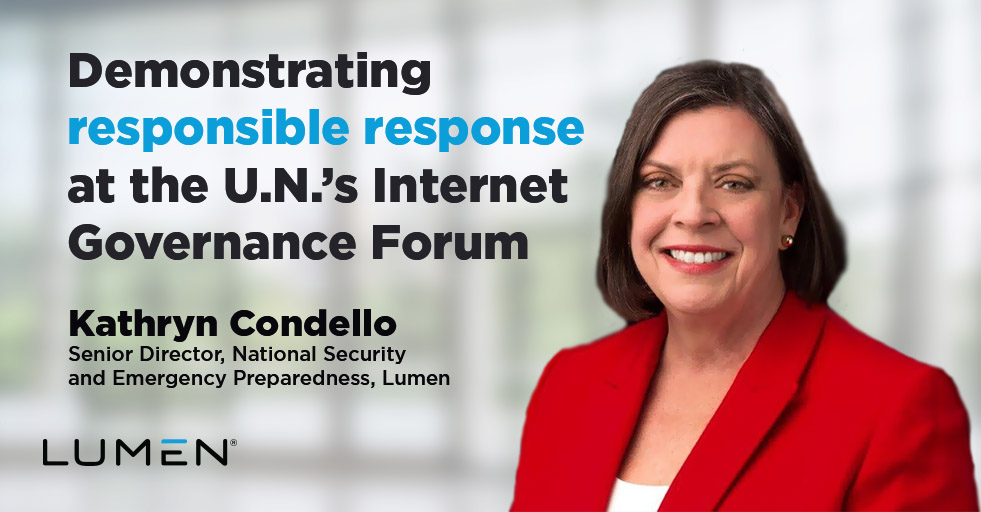Lumen Lede

More than 3,500 stakeholders from business, government, civil society, the technical community, and academia recently gathered virtually for the 15th Annual Meeting of the Internet Governance Forum (IGF) hosted by the United Nations. The overarching theme for this year’s conference was “human resilience and solidarity,” which enabled participants to highlight topics such as strategies and best practices for ensuring trust in the online world.
This year I was honored to be a co-panelist along with International Telecommunication Union Director Doreen Bogdan Martin and Professor Toshiya Jitsuzumi from Japan’s Chuo University at a session entitled, “Building trust through responsible response to global crises.” This panel provided the opportunity to highlight lessons learned to help assure reliable and secure connectivity during the global COVID-19 crisis.
A significant shift in global internet traffic
The social distancing techniques used to mitigate COVID-19 created a significant shift in the global internet traffic patterns in the first six months of 2020, driving increased demand for connectivity and bandwidth. The Information and Communications Technology (ICT) entities that supported this shift—the network, cloud, content, and collaboration providers—already have strong, bi-lateral business relationships with each other and regularly engage over the course of day-to-day business for the collective good of our respective customers.
An increased level of operational coordination among providers
The dynamic nature of these global traffic shifts however, led to increased, multilateral information sharing and operational coordination among large multinational providers so we could anticipate these shifts and adapt our respective networks to meet the changing demands. We leveraged this multi-lateral coordination not only to inform government of our operational status, but also to communicate important industry priorities such as the need for personal protective equipment and worked with government decision-makers to mitigate those concerns.
Industry prepared for the shift
While the global traffic and usage patterns shifted significantly due to the pandemic, we and our industry peers were prepared for this increase, which led to a largely seamless experience for our customers. Lumen operates one of the world's largest and most interconnected networks and believes that consistent, resilient, high-bandwidth connections are essential needs of all businesses and consumers.
The collaboration among network, cloud, content, and collaboration providers during COVID-19 is not the first example of large-scale, responsible response. This collaboration takes place on a routine basis in the cyber arena. Lumen's threat intelligence team, Black Lotus Labs, regularly collaborates with various partners to disrupt cyber actors, remove cyberthreats, protect our respective customers, and ensure our networks are a safer environment. But this collaboration is not an industry-only endeavor.
Industry taking a leadership position
One of the more recent examples of this public-private collaboration is the October takedown of a Trickbot ransomware operation infecting more than a million devices. This effort identified key components of Trickbot’s command and control architecture and severed the malware’s ability to connect to the infected systems. This takedown, however, would not have occurred without support from the courts to take this action.
These public-private efforts reflect increasing leadership of industry, supported by law. Together we are creating new operational mechanisms and setting new legal precedents for removing this malevolent activity from the ecosystem. This particular case reflects the ongoing reshaping for global norms of behavior in the ICT environment, one where “responsible response” is truly a partnership between industry and government.
In conclusion, whether providers like Lumen are responding to global crises in the form of COVID-19 or cyber threats, a flexible approach that allows for multi-lateral engagement across our global industry peers and with our government partners is essential.
This recent experience affirms our support for best practices that allow for voluntary, collaborative information sharing programs and helps ensure that solutions are technically feasible and achievable. These solutions must also not be cost-prohibitive and should not result in unintended economic or commercial consequences. Going forward, this flexibility will help us collectively address wide-scale threats, like COVID-19, as they emerge.






